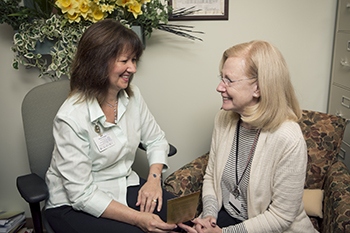Cancer isn’t easy. Being diagnosed can be just as overwhelming, scary, and unfair as treatment. It’s a difficult time for patients and their families alike.
At the Abramson Cancer Center at Pennsylvania Hospital, located in the historic Society Hill neighborhood, the Joan Karnell Supportive Care Program is there to help. For more than 15 years, the program has offered specialty services to guide cancer patients and their loved ones who are managing their new normal.

Marylou Osterman (left), coordinator of the Joan Karnell Supportive Care Program, sits with cancer survivor Ginny Fineberg.
It boasts social work, nutrition, and psychology services; art therapy and mindfulness programs; shiatsu massage therapy; and spiritual care with an in-house chaplain. Everything is provided at no cost to the Abramson Cancer Center patients.
Patients and their caregivers can receive help individually or in groups—it’s their prerogative. Marylou Osterman, the program’s coordinator, says she finds the weekly “Walkabout” group to be a hit.
Led by art therapist Caroline Peterson, patients are provided cameras to capture photos while they take slow, mindful walks around the hospital. When they return, they make collages with their images.
“It’s been a successful program going on for years and years,” says Osterman, who regularly helps match patients with services. “We recognize cancer can be a difficult journey, and we just want to have services that will be supportive.”
There’s a daytime group that’s facilitated by the program’s chaplain, Lucretia Hurley-Browning, and it’s for cancer patients with any diagnosis. Talks focus on relief from suffering, whether it is physical, emotional, social, or spiritual in nature. She also runs groups alongside a psychologist that is solely for caregivers.
“That grew out of the fact that caregivers and patients sometimes need some private time away from each other, just to be able to speak freely,” Osterman says.
Osterman says the program’s psychology coordinator, Sarah Richardson, works closely with the Psychology Department at Penn to garner interns to help out. They provide pro bono services to the patients.
“It’s been a game-changing service, for the patients and the students,” Osterman says. “The students get the training of working with patients with cancer, and it’s something that not every psychologist would have experience with. We’ve trained a lot of psychologists over the years.”
The program has recently approved the hiring of two nurse navigators, Osterman says. They will act as points-of-contact for newly diagnosed cancer patients.
“There are a lot of steps that need to be taken when you’re just diagnosed, and they will help you navigate that course,” she explains. “Social workers, which are like our angels, also provide this support."
To keep the program fresh in people’s minds, its workers often make recommendations to other services.
“For instance, a patient’s social worker may see that something is off and makes sure the nutritionist gets in touch with him or her,” Osterman says. “The shiatsu massage therapist might recommend someone for psychology counseling. Our team has been doing this for a while now, they know a lot about all our services.”
Osterman says not every cancer patient wants the help of the program. Resistance is normal, and is expected.
“Sometimes it’s just because they have their eye on that target of getting through treatment, and nothing else,” Osterman explains. “People find their way. But if at some point they kind of stumble, and you never know when it’s going to be, we’ll be here.”
The program is named after Joan Karnell, who was diagnosed with ovarian cancer in the early 1980s—back when women with cancer were often seen in the same offices as maternity patients. Karnell had a vision for a Pennsylvania Hospital with a separate, supportive area for people in similar situations as herself, and she spoke up about it. Years later, with her input in mind, the Joan Karnell Supportive Care Program was formed.
“It may sound like a cancer center is a depressing place to work, but I don’t find that,” Osterman says. “It’s hopeful.”
Originally published on December 17, 2015